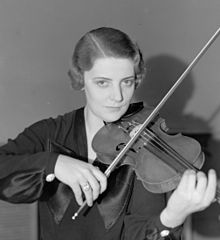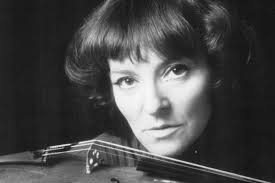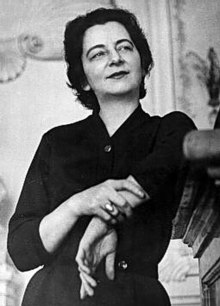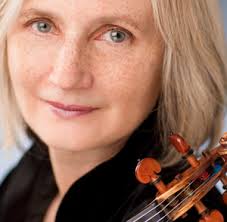At the height of his career, Paganini was asked who was the best violin player of them all.
“I don’t know who’s the best,” he answered with his natural modesty, “but the second-best is Karol Lipiński.
There were many superb Polish violinists. Many of them were born when Poland was not on the maps of Europe. Besides Lipiński’s, I won’t mention any names of men. I want to write about the women. They lived in the 20th century, and their careers often reflected stormy times in our history.

Grande dame of them all. Born just before the turn of the century into a musical family. Educated in Berlin, came to Poland after her country regained independence. In the aftermath of the German invasion in 1939, Dubiska refused to play for the Germans, risking her freedom by participating in the underground concerts. The biggest affront to the Germans was her refusal to play for Hans Frank, then a Governor of occupied Poland. During the Warsaw Uprising, she cooked meals for the soldiers, and in spare time entertained them with her play. Her Guarneri miraculously survived the German and Russian onslaughts. After the war, Dubiska worked as a teacher. Her best student was Wanda Wiłkomirska. Dubiska died in Warsaw.

Between the wars, she was already a prominent violinist. During the German occupation, Umińska, again, refused to play for the Germans and when the Warsaw Uprising broke out, she joined the Polish resistance in the Home Army as a nurse. Umińska was captured but escaped during the transport. After the war, she excelled as a superb teacher. And she too, as Dubiska, taught Wanda Wiłkomirska. Umińska died in Kraków.

Again, born to the musical family. Studied under Irena Dubiska and Eugenia Umińska. Her career blossomed after the war, and, when the Warsaw Philharmonic Concert Hall was rebuilt, she had the honor to perform during the inaugural concert. She was married to the influential Polish writer and politician, and divorced him two years after he was elected to the Central Committee of the Polish Communist Party. She had two sons, one of them immigrated to Australia. Wiłkomirska spent some time in the antipodes but died in Warsaw, the place she was born.

Born in Łódź, but educated in Warsaw. Subsequently noticed by Ignacy Paderewski, who founded her education in Paris. Before the war, she was a principal violinist of the Polish Radio Orchestra. During the German occupation, Bacewicz, again, refused public appearances. However, she gave many secret underground concerts. In her later years, she was known better as a brilliant composer. Bacewicz died in Warsaw.

But the real reason I am writing this short blog is to mention the fifth name. She is maybe not as well known as the four giants before, but she certainly stood on their shoulders. And she’s very dear to me since we studied in the same music school, Karola Szymanowskiego in Warsaw.
She was also born to a family of musicians. Her father was an architect, but her mother, her brother and her son all were, or are, musicians. Hania prides herself on playing the instrument made by her husband, a luthier. We competed for the seat of the first violinist in our school, and Hania won. Now I know why.
From Warsaw, she moved to Paris and then ended in New York. There she auditioned and was awarded a seat in the prestigious New York Philharmonic orchestra. And she was one of the first women to receive such an honor.
A few years ago, I had a pleasure of introducing my twin daughters, Megan and Jennifer to Hania, just to show how much Polish women can achieve with talent and grit. I can only hope they’ll remember her forever.
Good job, Haniu.


